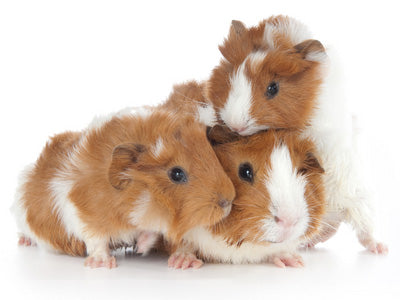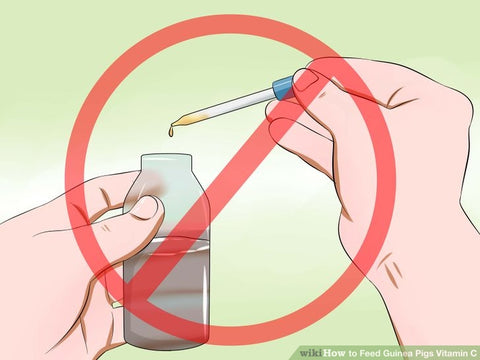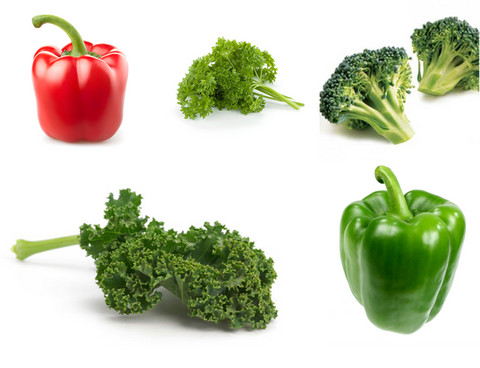A frequent topic of conversation amongst piggy parents is Vitamin C. How much do you give? What are the best foods? How much is too much?
There's a huge amount of information available on the subject and it's easy to get bogged down with figures, intakes and supplements not to mention milligrams, oxidation and deficiencies.
To clarify exactly what you need to know and how this can be incorporated easily in to your daily guinea pig care routine, we've scoured the internet, undertaken all the leg work and pulled all of the important bits into this comprehensive guide for you to use as an easy reference.
WHY IS VITAMIN C SO IMPORTANT FOR GUINEA PIGS?
Like humans, guinea pigs can't make their own Vitamin C (also known as Ascorbic Acid) and as such, the only source of the vitamin is through their diet. Vitamin C is important for healthy bones, blood vessels and connective tissues, it also plays a vital roll in several biological systems and processes within the body including collagen production.

Image credit: https://en.wikipedia.org/wiki/Vitamin_C
WHAT HAPPENS IF MY GUINEA PIG DOESN'T GET ENOUGH VITAMIN C?
A vitamin C deficiency is commonly known as scurvy and if left untreated can cause abnormalities in blood vessels, bones and connective tissues. Symptoms of Vitamin C deficiency in guinea pigs can include:
- lethargy, weakness, difficulty with mobility
- altered walking pattern due to enlarged, painful or stiff joints
- loss of appetite and subsequent weight loss
- diarrhoea
- discharge from the eyes and/or nose
- rough cough
- poor skin and fur condition
It is important to note that many of these symptoms may be as a result of something other than Vitamin C deficiency. If your guinea pig shows any of the above symptoms, you should take them to a vet as quickly as possible for an urgent assessment. Building a diagnoses from a set of varied symptoms is complex and should be left to the professionals.
HOW MUCH VITAMIN C DO GUINEA PIGS NEED?
We've found as many sources as possible that reference this amount and as an average, a guinea pig requires 10-30mg/kg daily (more on what this actually means later on). There are of course other factors that need to be taken into consideration. The requirement is based per kilogram meaning that the bigger your piggy the more Vitamin C they will require. Pregnant sows, poorly piggies or those with a deficiency that is being treated will also require more Vitamin C.

Photo Credit: http://petguineapigcare.com/breeding-babies/
CAN I GIVE MY GUINEA PIG TOO MUCH VITAMIN C?
Vitamin C is water soluble so a small excess will be processed by the kidneys and passed harmlessly from the body in the urine. It would be very difficult to give an excess of Vitamin C simply through fresh greens and daily pellets but if a Vitamin C supplement is used (more on this later) and an excess of 100mg/kg is ingested this can cause problems. Excessive Vitamin C intake has been linked to the development of kidney and bladder stones, worsening arthritis symptoms and poor growth amongst young piggies. If a piggy is is fed a high level of Vitamin C over a long period of time this can also reduce their sensitivity to Vitamin C and cause a condition known as Pseudo-Scurvy. In Pseudo-Scurvy, a reduced sensitivity to Vitamin C means that what would usually be considered a normal 10-30mg/kg intake of Vitamin C wouldn't be sufficient and could like to symptoms of deficiency. If you think this may be the case in a member of your herd, veterinary advice should be sought immediately.
SHOULD I FEED A VITAMIN C SUPPLEMENT ALONGSIDE A NORMAL DIET?
Opinion varies on this between authors and piggy parents. In some circumstances, for example a poorly piggy, pregnant sow or guinea pig with an underlying condition preventing the intake or absorption of Vitamin C, a supplement may be necessary to maintain good health. This should be given in accordance to veterinary advice. If a supplement is given it is important that a simple Vitamin C is used, not a multi-vitamin or mixed supplement. This can lead to complications in guinea pigs and may cause a toxic build up of some elements. It is also widely advised that Vitamin C should not be added to water bottles as the vitamin degrades quickly in water and light, it can encourage bacteria to grow and the altered taste may prevent your guinea pigs from drinking at all which is very dangerous.
 Photo Credit: http://www.wikihow.com/Feed-Guinea-Pigs-Vitamin-C
Photo Credit: http://www.wikihow.com/Feed-Guinea-Pigs-Vitamin-C
Personally, as life long piggy parents we have never routinely given additional supplements to any of our guinea pigs as part of their everyday care. We believe that a good quality Timothy hay combined with a guinea pig specific pellet (not mix) and varied supply of fresh food should be sufficient to maintain a healthy intake of Vitamin C. We've never had a problem with Vitamin C deficiency. Of course, each guinea pig has their own unique requirements and if there is any aspect of their care that concerns you or leads you to believe that they require an additional supplement, we recommend that you discuss this with your vet on a case by case basis.
WHAT ARE THE BEST FOODS FOR VITAMIN C?
Below, we have compiled a list of the top 5 foods for vitamin C content. They're not necessarily the foods with the highest Vitamin C content but a considered variety that can be fed to your piggies on a regular basis. Some foods, for example kiwi, oranges, melons and grapefruit are very high in Vitamin C but must be fed sparingly given their high sugar and/or acid content. Dark greens such as cabbage, turnip greens, beetroot greens and mustard spinach must also be limited to 1-2 feeds per week given their high calcium content which can, over time, lead to the development of kidney or bladder stones.
|
FOOD HIGH IN VITAMIN C |
mg OF VITAMIN C PER 100g |
PORTION PER DAY PER AVERAGE SOW 900g |
PORTION PER DAY PER AVERAGE BOAR 1200g |
|
Red Bell Pepper |
190 |
1/16 of a pepper (quarter of a quarter) |
1/12 of a pepper (third of a quarter) |
|
Parsley |
133 |
1/3 of a small bunch (or one sixth of a plant from supermarket) |
½ of a small bunch (quarter of a plant from supermarket) |
|
Curly Kale |
120 |
½ medium kale leaf |
2/3 of a medium kale leaf |
|
Broccoli |
93.2 |
1 small floret |
1 ½ small florets |
|
Green Bell Pepper |
89.3 |
1/8 of a pepper (half of a quarter) |
1/5 of a pepper |
mg of Vit. C per 100g figures: http://www.guinealynx.info/chart.html all other calculations are our own
The above suggestions are based on a Vitamin C intake of 30mg/kg per day, average vegetable weight (red bell pepper 220g, kale 50g per medium leaf, broccoli 30g per small floret, green bell pepper 220g and parsley 55g per small bunch) and portions for an average sow (900g) and average boar (1200g). The suggestions are intended as a guide to ensure that enough Vitamin C is included in your guinea pigs diet, not as a complete diet plan. A selection of these foods accompanied by a constant supply of good quality fresh Timothy hay and measured allowance of guinea pig specific pellets is the best diet combination for a healthy guinea pig.

BEST PRACTICE FOR A HEALTHY VITAMIN C INTAKE
- Vitamin C has a half-life of approximately 10 days in vegetables. This means that from the point of being harvested, the amount of viable Vitamin C contained within the food decreases by half every 10 days. Always feed vegetables, greens and fruit as fresh as possible for maximum nutrient content.
- Feed a selection of the above foods consistently every day to ensure a stable level of Vitamin C in your guinea pig.
- Seriously consider whether additional supplementation is necessary. Adequate Vitamin C should be achieved through a varied diet. If your guinea pig has additional needs, is poorly or has a condition where additional supplementation is required, this should always be under the advice of a vet.

How does vitamin c supplement work and how does it affect the Guinean pigs body system?
A very well written and informative article, thank you. This really helped clarify how much Vitamin C my piggies need.